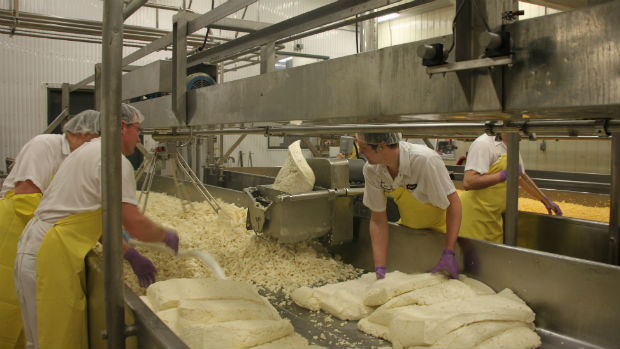A Comprehensive Check Out Cheese Manufacturing: Active Ingredients, Approaches, and the Future of Craftsmen Cheeses
The intricate procedure of cheese production is an interesting merging of art and science, where high-quality milk, rennet, and particular microbial cultures serve as fundamental aspects. As the sector increasingly prioritizes sustainability and openness, the future of artisan cheeses assures to show both heritage and progress.
Secret Ingredients in Cheese Production
A range of vital active ingredients play a pivotal function in cheese manufacturing, each contributing to the end product's taste, texture, and character. The main active ingredient in cheese is milk, which can come from different resources, consisting of cows, goats, and sheep - cheese for sale online. The sort of milk utilized considerably affects the cheese's preference and uniformity; for example, cow's milk generally generates creamier cheeses, while goat's milk commonly creates zesty selections
An additional crucial active ingredient is rennet, an enzyme made use of to curdle the milk, dividing it right into curds and whey. The resource of rennet can be animal, veggie, or microbial, each giving unique qualities to the cheese.
Salt not only boosts the taste however also works as a chemical, preventing the growth of unwanted germs. Furthermore, various flavor representatives, such as herbs, spices, and even smoked timber, can be included in develop special artisanal cheeses. Together, these ingredients form the structure of cheese production, setting the phase for varied and rich cheese varieties.
Traditional Cheese-Making Strategies
Utilizing traditional cheese-making techniques, artisans worldwide protect classic techniques that have actually been passed down via generations. These strategies commonly stress making use of high-quality, in your area sourced milk, which is main to the distinct flavors and structures of artisanal cheeses. The process usually begins with the careful home heating of milk, complied with by the addition of societies and rennet to help with coagulation.
Once the curds create, they are reduced, permitting whey to drain pipes, a crucial step that influences moisture content and appearance. Salting is an essential facet of this process, enhancing flavor while also acting as a chemical.
Aging, or affinage, is another vital element, throughout which cheeses develop their characteristic fragrances and preferences. Artisans may employ particular maturing settings, using moisture and temperature controls to fine-tune celebrity's account. The commitment to these standard techniques not only supports neighborhood economies but additionally contributes to the rich diversity of cheese ranges discovered internationally, celebrating cultural heritage and artisanal workmanship.
Modern Technologies in Cheese Manufacturing
How have technical advancements changed cheese production in current years? The assimilation of contemporary technology has actually changed both the efficiency and top quality of cheese manufacturing. Automation in various stages of the process-- from curd development to packaging-- has boosted consistency while decreasing labor prices. For example, automated curd cutting and mixing systems enable accurate control over appearance and wetness levels, crucial variables influencing the end product.
Furthermore, advancements in microbiology have made it possible for cheesemakers to select specific microbial societies and enzymes, maximizing taste profiles and boosting service life. Making use of sensor modern technology for checking fermentation problems has actually also come to be common, permitting real-time changes to preserve optimal environments for cheese aging.

These developments not only boost the quality and sustainability of cheese production but additionally empower craftsmen producers to maintain typical tastes while embracing modern-day performance. As modern technology remains to evolve, the future of cheese production looks encouraging, mixing custom with innovation.
The Role of Terroir in Cheese
In the world of cheese production, terroir plays a critical role in defining the distinct qualities of various cheeses. Terroir, a French look at here now term typically related to wine, includes the ecological elements that affect farming items, consisting of dirt composition, climate, and regional vegetation and fauna. In cheese-making, the unique characteristics of the region where the milk is sourced can convey particular flavors and structures to the end product.
As an example, the grazing conditions of dairy products animals significantly impact the milk's composition, affected by the kinds of turfs and natural herbs readily available in a specific locale. This differs not just in between countries however likewise in between areas within the same country. Furthermore, the microbial areas present in the atmosphere add to the fermentation procedures, leading to diverse profiles in taste and fragrance.
Cheeses such as Roquefort, Parmigiano-Reggiano, and Cheddar exemplify how terroir can shape their identifications, making them distinct and commonly safeguarded by geographical indicators. As manufacturers significantly identify the importance of terroir, there is a growing emphasis on sourcing important site regional active ingredients and keeping conventional methods, making certain that each cheese really reflects its origin.

Future Fads in Craftsmen Cheeses
A noteworthy shift is taking place in the artisan cheese industry, driven by evolving customer preferences and technical improvements. Increasingly, customers are inclining unique, high-quality items that stress both sustainability and regional sourcing - cheese factory melbourne. This fad is motivating artisan cheesemakers to introduce, focusing on small-batch production and making use of standard strategies while incorporating modern innovation to enhance quality and safety
Furthermore, there is a growing interest in plant-based and alternate dairy items, pushing standard cheesemakers to explore brand-new methods, such as cashew or almond-based cheeses. This change not only satisfies nutritional restrictions yet likewise aligns with ecological issues regarding animal farming.
In addition, openness in sourcing and production processes is coming to be extremely important. Consumers are extra enlightened and demand traceability, motivating producers to embrace clearer labeling methods and participate in storytelling that highlights their techniques and worths.
Final Thought
To conclude, the elaborate procedure of cheese manufacturing blends conventional strategies with modern-day advancements, leading to a varied range of tastes and textures. The emphasis on high-quality components and the impact of terroir highlight the artistry included in cheese manufacturing. As the sector develops, a concentrate on sustainability and transparency will likely shape the future of artisan cheeses, accommodating a significantly discerning customer base that i was reading this values credibility and craftsmanship in dairy items.